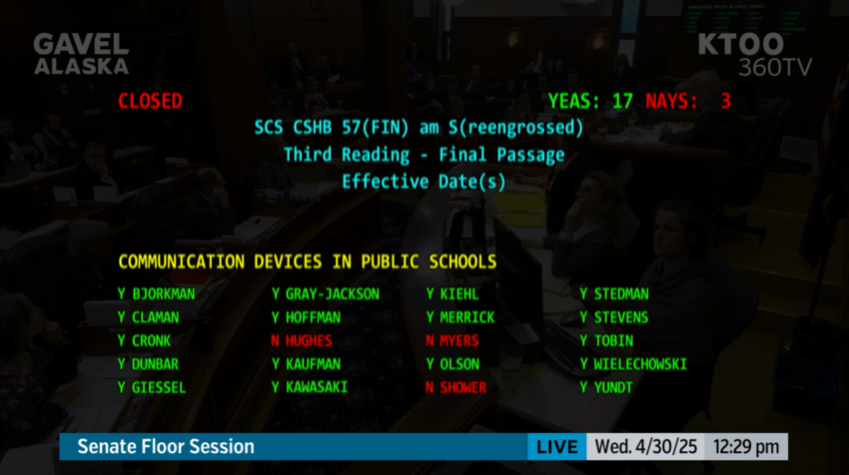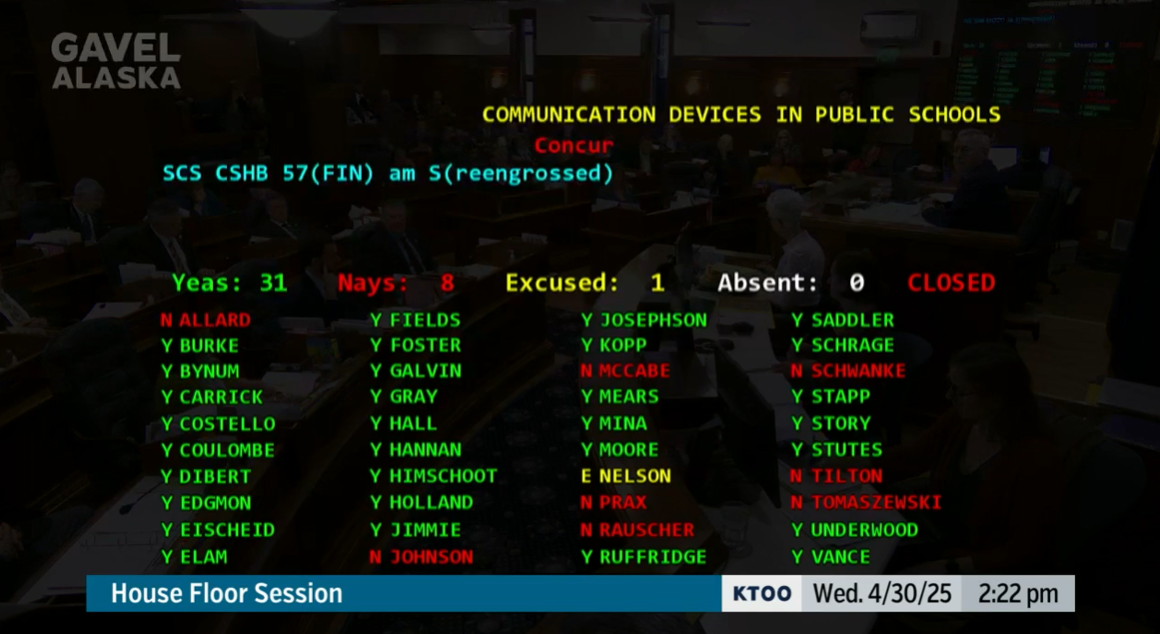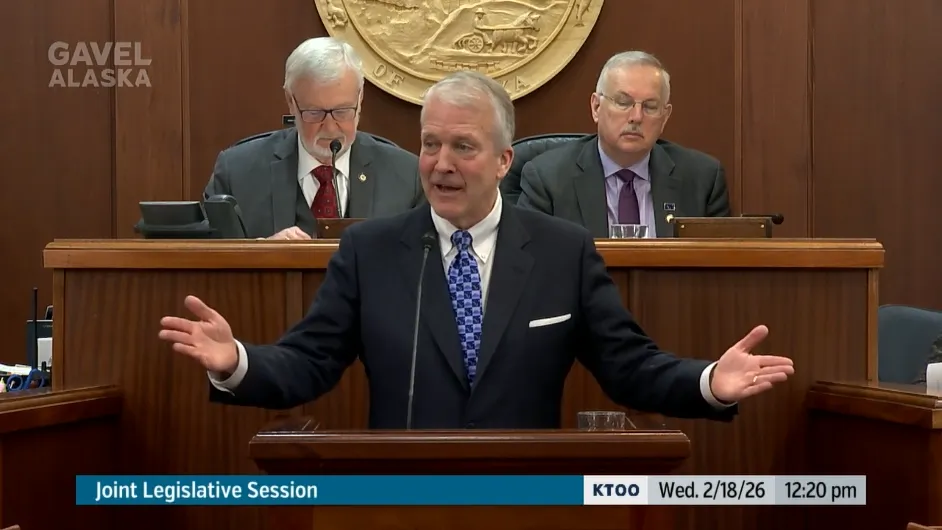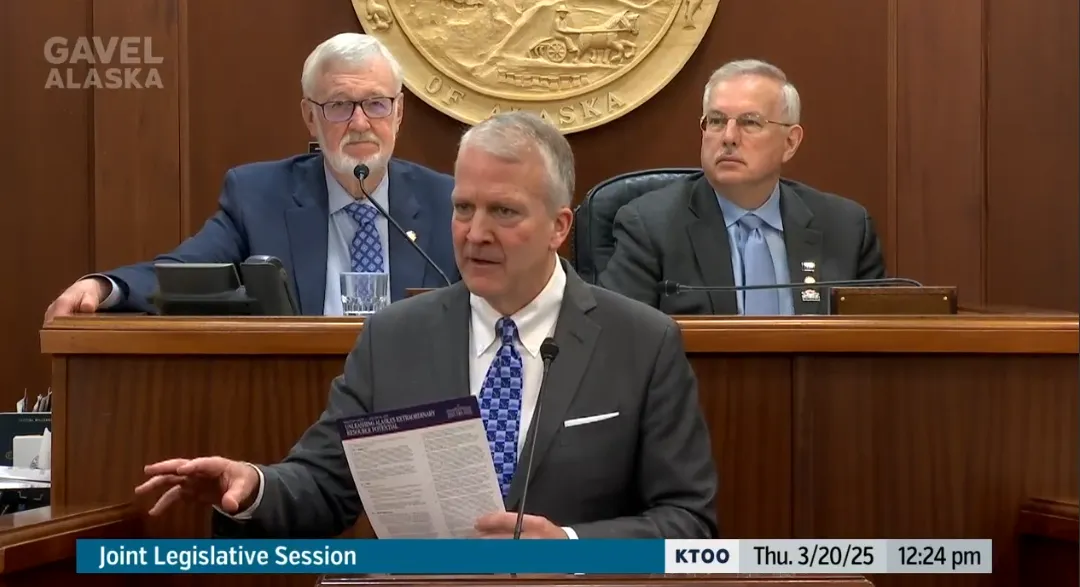Legislators salvage an education bill as the clock ticks down on the session
As the final days of the session approach, hopes give way to what's doable.

Happy Friday, Alaska. It’s Day 102 of the legislative session.
In this edition: A week after education funding was looking doomed, and just when things were looking doomed, legislators managed to salvage an education funding bill with enough votes to override a potential veto (though, as we saw last year, it’s far from guaranteed that people will stick to their votes). It’s far below what many had hoped to secure in funding this year – leaving districts to make cuts this year – but it’s what the budget hawks say is manageable given everything. Meanwhile, the Senate’s budget hawks are moving forward with the lowest inflation-adjusted dividend in state history to balance the state’s budget. In other notable news, the House also advanced campaign finance limits this week, hoping to rein in the wild west of spending since limits were struck down in 2021. Also, the reading list and weekend watching.
Current mood: 😎
Legislators salvage an education bill

A week removed from their failed override of Gov. Mike Dunleavy’s veto of public school funding, legislators managed to salvage a scaled-back education bill that attempts to thread the needle between competing budget and policy pressures.
House Bill 57 links a permanent increase to the state’s per-student funding figure to a slate of scaled-back policy changes, which include a cellphone ban, maximum class size guidelines and a task force to look at longer-term funding and policy issues for public education. The biggest post of new money – incentive grants for schools where students are reading at grade level or showing improvement – also comes with a way to pay for it.
It passed the Senate on a 17-3 vote and the House on a 31-8 vote, giving the Legislature a combined vote total of 48-11. That’d be enough to override a veto if all legislators stick to their votes (something that didn’t happen with the 2024 education veto, so it’s far from a foregone conclusion).
Instead of a $1,000 increase to the base student allocation, the state’s baseline per-student funding figure that flows through a formula taking into account students’ needs to determine total education funding, the bill proposes a $700 increase to the BSA. When compared to the one-time money equating to a $680 BSA increase in the current year’s budget, the funding essentially just keeps up with inflation.
Still, it’s what Senate Finance Committee co-chair Sen. Bert Stedman, a Sitka Republican who broke from the Senate Bipartisan Coalition Majority to vote in favor of the override last week, said is doable under the current budget crunch facing the state.
“One of the things that we’ve struggled with is that it was too big of a step financially, too big of a step policy-wise. This is a much smaller step, but it’s also deliverable. Financially, it’s deliverable. Policy-wise, it’s deliverable,” he said. “I think we can all agree that solving the education challenge isn’t going to be concluded this year. It’s going to be a multiple-year process, and this will be one step with several more to come.”
Make no mistake, though, districts will still likely face cuts. Even when a $1,000 BSA increase was on the table, several school districts warned that it wouldn’t be enough to keep them whole.
Last week, the Kenai Peninsula Borough School District’s Board of Education approved a budget based on a $680 BSA increase that still calls for the closure of two schools and severe cuts to staff. Per the Peninsula Clarion’s reporting, the draft budget eliminates elementary school counselors, small school counselors, counseling assistants, student support liaisons, pool managers and theater technicians. Cuts would also hit the district’s homeschool program, the district’s middle college school and extracurriculars.
For Kenai students and students around the state, the legislation is far from a silver bullet.
“It’s kind of like taking a home from someone,” Student Representative Emerson Kapp said, according to the Clarion. “Taking it away brick by brick. You still technically have a building, but you’re slowly not making it a home anymore.”
Still, legislators hope that there are things in the bill that will ultimately help schools. The biggest change is the inclusion of incentive funding grants that would go to schools for each student who is reading at or above grade level or showing improvement. While some have questioned such funding mechanisms, noting that it’s likely the students who aren’t performing well that need the most help, conservatives argue it’s an important way to encourage schools to continue to improve.
Wasilla Sen. Robert Yundt, who spearheaded the negotiations for the Republican Senate Minority, said it was the most important part of the bill for him.
“This is the reading grant that rewards kids and schools for making improvements in being at or above grade level. This is what we want. It incentivizes good behavior, it incentivizes growth,” he said. “This is quite possibly the best thing today in regard to policy.”
To pay for the reading grants, Yundt tied the provisions to the successful passage of another bill that would update the state’s corporate income tax structure to apply to businesses doing online sales in the state. That provision is estimated to raise more than $65 million per year and would be one of the first new significant revenue streams approved in years.
For some Republicans, making the grants conditional on a tax passing was a bridge too far, even if it was in service of a program they support. Republican Sens. Mike Shower and Shelley Hughes voted for the measure on Monday but switched their votes when the measure was brought back up on Wednesday due to a minor drafting error. Both said they had second thoughts in the intervening days.
What’s next
The legislation went to the governor’s office on Thursday, setting up a clock for him to sign the bill, veto it or allow it to go into law without his signature by May 17. That would give legislators an opportunity to override his veto before the session is set to end on May 21.
They would need 40 votes to override the governor, a bar they fell seven votes short of earlier this session and a single vote short of last year.
The governor has not publicly indicated his plans for the bill, but Department of Education Commissioner Deena Bishop was caught trying to bully school districts into supporting the governor’s policies – many of which weren’t included in the bill beyond the task force’s focuses – or risk another veto. That pressure campaign hasn’t sat well with many districts or legislators.
House Speaker Bryce Edgmon told the Alaska Beacon that he was surprised to see the letter and that it was unusual for department heads to be involved like that.
“I don’t think her letter had any material effect,” he said. “I don’t remember, at least as a legislator, ever seeing an agency head or a department official attempting to get outside entities, such as school districts in this case, to actively work to persuade the Legislature to take the position. I don’t remember that happening.”
Still, all that said, the governor’s office has been notably quiet on the bill. Previously, he had been quick to take to social media to signal his displeasure with the legislation, calling one version of the education funding bill a “joke.”
Hopefully, the fact that he isn’t on social media attacking the bill is a good sign.
Stay tuned.
The votes


A $1,000 dividend advances

The Senate Finance Committee unveiled its version of the operating budget on Thursday, a sober bill that strips out pretty much any additional spending that the House or governor requested to keep it in line with the state’s uninspiring revenue picture. To close the last remaining deficit in the bill – and thereby avoiding a politically tricky vote to spend from state savings – the senators cut the proposed dividend payment down to what the Alaska Beacon reports is the lowest inflation-adjusted amount in state history.
Instead of the $1,400 that the House proposed or the $3,000+ that the governor proposed, the Senate Finance budget pulled down the amount to $1,000. By doing so, they ax about $265 million in spending and balance the budget.
Senators have been signaling that cutting the PFD once more was on the table to balance this year’s budget. While the House has signaled some interest in tapping into the state’s Constitutional Budget Reserve to cover spending, the Senate has drawn a hard line against any such spending. During the debate on the education bill, Senate Finance Committee co-chair Sen. Bert Stedman argued that the Legislature needs to maintain as much in savings for the next few years as possible given the swirling uncertainty around the state’s two biggest sources of income – oil prices and investment income, both of which have taken a hit under Trump.
The Senate Finance Committee advanced the bill out of committee on Friday morning, setting it up for a floor vote next week.
Once the Senate passes the budget and the House votes on concurrence, it’ll send the budget to the conference committee and trigger the Legislature’s 24-hour rule, which allows committee meetings to be noticed a day ahead rather than a week ahead.
Campaign finance limits advance

Alaska’s state campaigns have operated without any campaign finance limits since a federal judge struck them down in 2021, and the money has poured in. In the run-up to the 2024 election, candidates cashed checks as high as $30,000, 60 times more than the old $500 per year limit allowed.
A bill passed by the Alaska House on Monday seeks to put a stop to that.
House Bill 16 by Rep. Calvin Schrage, I-Anchorage, would reinstate campaign contribution limits for candidates, setting a $2,000 limit for campaign cycles that would be adjusted for inflation afterward. Schrage said he believes the changes would solve the constitutional issues raised by the judge, who found that the limits were simply too low.
“This bill would allow us to reinstate those limits and again provide that protection to Alaskans and frankly to us as elected officials in helping to ensure that there is some faith and confidence among Alaskans in their elected officials acting with integrity and not having undue influence on them by outsized donations,” he said during the debate on Monday, noting that Alaska voters have twice before approved contribution limits through voter initiative. “This is something that Alaskans very clearly want.”
Schrage would know. He’s one of the primary sponsors of what would be the state’s third voter initiative to limit political spending in Alaska. That measure has already gathered enough signatures and is slated to appear on the 2026 ballot unless the Legislature pre-empts the measure by passing a similar one. Schrage said Alaskans don’t want to wait.
“I think Alaskans would prefer, however, that we act more quickly, that we put these limits in place now and forgo the expense and burden of having to have this on the ballot,” he said.
Still, campaign finance limits have faced an uphill battle since they were overturned.
Similar efforts to pass campaign contribution limits have died in both the House and Senate over the recent years, with one of the big sticking points being Republican Gov. Mike Dunleavy’s opposition to any limits. Dunleavy, who has deep-pocketed backers, has benefited heavily from the unlimited contributions.
Rep. Sarah Vance, a Homer Republican and close Dunleavy ally, argued against instituting any campaign contribution limits, arguing that it infringed on free speech.
“I believe in Alaskans’ right to free speech, and the courts have ruled that political contributions are free speech,” she said. “We’ve gone through an entire election cycle without any limits. And I have not once heard on record any specific Alaskan contributions that have given the appearance or showed proof of corruption.”
She also complained that the measure does nothing about independent expenditure campaign spending — groups that are allowed to raise and spend unlimited amounts of cash on races in Alaska as long as they don’t directly coordinate with candidates. Schrage noted that that type of spending is the direct result of the U.S. Supreme Court’s ruling on Citizens United and cannot be reined in.
Vance and all but one Dunleavy-aligned Republican voted against the measure. Moderate Soldotna Republican Rep. Justin Ruffridge was the lone member of the House Minority Caucus to vote for the measure.
It ultimately passed 22-18, and is already scheduled for a hearing in the Senate later this week.
The reading list
- Misinformed by election officials, American Samoans in Alaska now face prosecution
- UAS professors on the front-lines of glacial outburst flood prediction
- ‘Life or death’: What happens now to suicidal young Alaskans with closure of Crisis Recovery Center
- Bills aimed at rescuing ailing Alaska seafood industry face tough budget challenges
- Alaska education commissioner urged superintendents to lobby legislators for Dunleavy or risk a veto
- Large crowd gathers at Anchorage’s Park Strip for May Day rally
- Alaska’s US Rep. Nick Begich co-sponsors bill to limit ranked choice voting
Weekend watching
It's been 30 years since "A Goofy Movie" came out, taking Goofy and his son on a not-so-Disney adventure that explored the difficult relationship between a, well, goofy father and his growing son.
Have a nice weekend, y'all.
The Alaska Memo Newsletter
Join the newsletter to receive the latest updates in your inbox.




